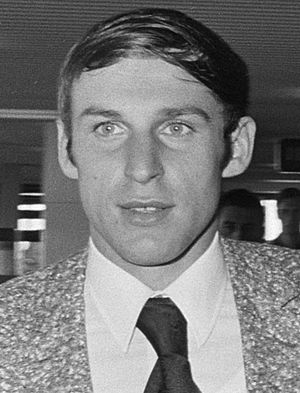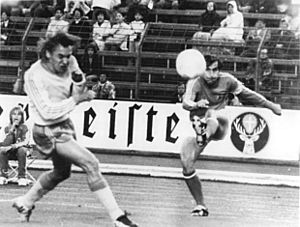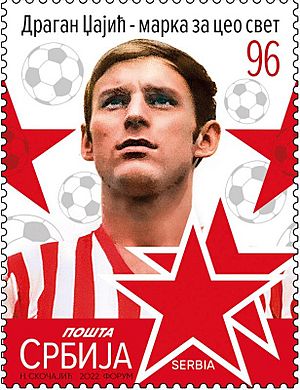Dragan Džajić facts for kids
Quick facts for kids
Dragan Džajić
|
||||||||||||||||||||||||||||||||||||||||||||||||||||||||||||||||||||||||
|---|---|---|---|---|---|---|---|---|---|---|---|---|---|---|---|---|---|---|---|---|---|---|---|---|---|---|---|---|---|---|---|---|---|---|---|---|---|---|---|---|---|---|---|---|---|---|---|---|---|---|---|---|---|---|---|---|---|---|---|---|---|---|---|---|---|---|---|---|---|---|---|---|

Džajić in 1970
|
||||||||||||||||||||||||||||||||||||||||||||||||||||||||||||||||||||||||
| President of Football Association of Serbia | ||||||||||||||||||||||||||||||||||||||||||||||||||||||||||||||||||||||||
| Assumed office 14 March 2023 |
||||||||||||||||||||||||||||||||||||||||||||||||||||||||||||||||||||||||
| Preceded by | Nenad Bjeković (acting) | |||||||||||||||||||||||||||||||||||||||||||||||||||||||||||||||||||||||
| President of Red Star Belgrade | ||||||||||||||||||||||||||||||||||||||||||||||||||||||||||||||||||||||||
| In office 19 December 2012 – 19 June 2014 |
||||||||||||||||||||||||||||||||||||||||||||||||||||||||||||||||||||||||
| Preceded by | Vladan Lukić | |||||||||||||||||||||||||||||||||||||||||||||||||||||||||||||||||||||||
| Succeeded by | Svetozar Mijailović | |||||||||||||||||||||||||||||||||||||||||||||||||||||||||||||||||||||||
| In office 1998–2004 |
||||||||||||||||||||||||||||||||||||||||||||||||||||||||||||||||||||||||
| Preceded by | Svetozar Mijailović | |||||||||||||||||||||||||||||||||||||||||||||||||||||||||||||||||||||||
| Succeeded by | Dragan Stojković | |||||||||||||||||||||||||||||||||||||||||||||||||||||||||||||||||||||||
| Personal details | ||||||||||||||||||||||||||||||||||||||||||||||||||||||||||||||||||||||||
| Born |
Dragan Džajić
30 May 1946 Ub, PR Serbia, Yugoslavia |
|||||||||||||||||||||||||||||||||||||||||||||||||||||||||||||||||||||||
| Height | 1.74 m (5 ft 9 in) | |||||||||||||||||||||||||||||||||||||||||||||||||||||||||||||||||||||||
| Occupation | Footballer Football administrator |
|||||||||||||||||||||||||||||||||||||||||||||||||||||||||||||||||||||||
|
Association football career
|
||||||||||||||||||||||||||||||||||||||||||||||||||||||||||||||||||||||||
Dragan Džajić (Serbian Cyrillic: Драган Џајић), born on May 30, 1946, is a famous Serbian football administrator and former player. He is currently the president of the Football Association of Serbia, a role he took on March 14, 2023.
Many people believe Džajić is one of the best footballers ever from the former Yugoslavia. He is also considered one of the greatest left wingers of all time. Džajić was known for his amazing crosses, accurate passes, and fast dribbling. He had great natural skill and a powerful left foot for free kicks.
In November 2003, UEFA celebrated its 50th anniversary. Džajić was chosen as the "Golden Player" for Serbia and Montenegro. This award recognized him as their most outstanding player from the past 50 years.
Contents
Playing Career: A Football Legend
Dragan Džajić was born in Ub, a small town about 60 kilometers from Belgrade. His football career, from 1961 to 1978, was mostly spent with Red Star Belgrade. As a left winger, he played 590 games for the club and scored 287 goals. During his time there, Red Star won five league titles and four Yugoslavian Cups.
In 1969, Džajić received the Sport newspaper's Golden Badge award. This award recognized him as Yugoslavia's best athlete. He is seen as one of the most important players in Red Star's history. He is also one of only five players to be given the special Zvezdine zvezde status, which means "Star of Stars."
Red Star Belgrade: Early Days and Triumphs
Starting Young in Football
Dragan Džajić was discovered by Red Star Belgrade's youth coach Miljan Miljanić. He joined Red Star from his local club, FK Jedinstvo, and spent two years in their youth training program.
Džajić made his first team debut when he was just 17 years and 8 days old. This happened on June 8, 1963, in a Yugoslav First League match against FK Budućnost Titograd. The game ended in a 0–0 draw. This was the last week of the 1962–63 league season. Red Star's home stadium, Marakana, was still being built. So, the match was played at Omladinski Stadium.
Džajić first played as a left-back, but he became famous playing further up the field. He was an amazing dribbler. His left foot helped create many goals for his teammate Vojin Lazarević. Džajić won championship medals in 1964, 1968, 1969, 1970, and 1973. He also lifted the cup in 1964, 1968, 1970, and 1971.
European Cup Challenge
Red Star Belgrade almost won the European Champion Clubs' Cup. In the 1970–71 season, they reached the semi-finals. They beat Panathinaikos FC 4–1 in the first game in Belgrade. However, Džajić could not play in the return match in Athens. The Greek team won that game 3–0, and advanced because of the away goals rule.
Playing in France: SC Bastia
From 1975 to 1977, Džajić played for SC Bastia in France. He scored 31 goals for them. He is remembered as one of their most important players ever.
International Career: Representing Yugoslavia
Džajić was only 18 when he first joined the Yugoslavia national team. His first game was on June 17, 1964, against Romania. Yugoslavia lost 2–1 in that match. Džajić went on to play 85 games for Yugoslavia, which is the most in the team's history. He scored 23 goals. He was known for his great passing, dribbling, and goal-scoring skills.
He played in the 1968 European Championship semi-final against England. In that game, he scored a goal in the 87th minute, lobbing the ball over goalkeeper Gordon Banks. This gave Yugoslavia a 1–0 victory against the world champions at the time. The British newspapers called him "the magic Dragan". He also scored in the final against Italy. However, Yugoslavia lost 2–0 after a replay.
Džajić shared his thoughts about his famous matches at Euro 1968:
I have good memories from that championship. It's true that losing in the final was tough, but looking back, we achieved a great result. Many excellent teams were behind us. Against the home team, Italy, we faced a difficult situation. The referee seemed to favor them, and they won with his help. In those circumstances, our team couldn't win the gold medal. It's also a shame that Ilija Petković wasn't in the replay match, as our game would have been much faster.

Džajić also played in the 1974 FIFA World Cup in West Germany. He played in Yugoslavia's first game, a draw with world champions Brazil. He scored one goal in a huge 9–0 victory against Zaire. After moving past the first stage, Yugoslavia did not continue their strong performance. They lost three games in a row and had to go home.
Life After Playing: Football Administrator
Džajić stopped playing football in 1978 when he was 32 years old. Right away, he started working as Red Star's technical director. In his first season in this new role, the club reached the UEFA Cup final. Džajić became the main person in charge of deciding which players the club would buy or sell.
In 1998, Džajić became the president of Red Star. He stepped down from this position in 2004 due to health reasons.
Return to Red Star and New Roles
In December 2011, there was talk that Džajić might return to Red Star's management. Many believed he was the only one who could help the club improve. However, this did not happen at that time. Džajić said he wanted to help the club because of his strong connection to it. He wished Red Star better days.
On December 19, 2012, Džajić was elected as President of Red Star Belgrade for a second time. He resigned from this role on June 19, 2014. After that, he was chosen as the honorary president of the club.
On March 14, 2023, Dragan Džajić was elected president of the Football Association of Serbia for a four-year term.
Legacy: A Lasting Impact
In November 2011, the website Goal.com named Džajić in "the greatest European Championship XI of all time." This means he was chosen as one of the best players in the history of the European Championship.
On December 2, 2022, Red Star Belgrade announced a special honor for Džajić. The number 11 jersey, which Džajić wore, was retired starting from the 2023–24 season. This means no other player will wear that number for the club.
Achievements and Awards
Red Star Belgrade
- Yugoslav First League: 1963–64, 1967–68, 1968–69, 1969–70, 1972–73
- Yugoslav Cup: 1963–64, 1967–68, 1969–70, 1970–71
- Mitropa Cup: 1968
Yugoslavia
- Mediterranean Games: 1971 (Gold Medal)
- UEFA European Championship runner-up: 1968 (Silver Medal)
Individual Awards
- UEFA Euro Top Scorer: 1968
- UEFA Euro Team of the Tournament: 1968, 1976
- Ballon d'Or (3rd place): 1968
- Golden Badge: 1969
- FUWO European Team of the Season: 1968, 1969, 1970, 1972
- ADN Eastern European Footballer of the Season: 1968, 1970
- World Soccer World XI: 1969, 1973
- Best Sportsman of SD Crvena Zvezda: 1966, 1967, 1968, 1969, 1970
- Sport Ideal European XI: 1971, 1972
- YU-Serbian UEFA Golden Player: 2004
- FIFA XI: 1968
See also
 In Spanish: Dragan Džajić para niños
In Spanish: Dragan Džajić para niños
 | Lonnie Johnson |
 | Granville Woods |
 | Lewis Howard Latimer |
 | James West |


